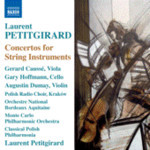
Petitgirard: Concertos for String Instruments (including Cello Concerto)
 $25.00
Out of Stock
$25.00
Out of Stock6+ weeks add to cart
LAURENT PETITGIRARD
Petitgirard: Concertos for String Instruments (including Cello Concerto)
Gary Hoffmann / Gerard Causse / Augustin Dumay / Monte Carlo Philharmonic Orchestra / Laurent Petitgirard
[ Naxos / CD ]
Release Date: Wednesday 15 August 2007
This item is currently out of stock. It may take 6 or more weeks to obtain from when you place your order as this is a specialist product.
Laurent Petitgirard is an eclectic musician with a compelling melodic gift, who combines a career as a composer of orchestral and film music with that of an international conductor.
Eclectic as a musician, Laurent Petitgirard combines a career as a composer of symphonic and film music with that of a conductor, appearing internationally with orchestras including the Orchestre de l'Opéra National de Paris, Orchestre Philharmonique de Monte-Carlo, Orchestre National de France, Bamberg Philharmonic, Berlin Symphony, Tonhalle, La Fenice, the BBC, Seoul Philharmonic and the Suisse Romande. He served as Music Director of the Orchestre Symphonique Français from 1989 to 1996 and was appointed Music Director of the Orchestre Colonne in 2004.
Laurent Petitgirard's first opera, Joseph Merrick dit Elephant Man, had its première under his direction in Prague, followed by a staging at Nice under the stage director Daniel Mesguich. The opera has been released on CD ( Naxos 8.557608-09) and on DVD (Marco Polo 2.220001). In May 2006 it was given a new production by the Minneapolis Opera.
After Le Fou d'Elsa, for contralto and orchestra, his more recent works include Le plus ardent à vivre… (septet with harp), Poème for large string orchestra, and Dialogue for viola and orchestra. Les Douze Gardiens du Temple, commissioned by Radio France, had its première in 2006 at the Festival Présences. His second opera, Guru, a state commission, will be premièred at the Opéra de Nice in November 2009.
Laurent Petitgirard was awarded the Grand Prix Lycéen des Compositeurs in 2000 and the SACD Prix Musique in 2001. A Commandeur des Arts et Lettres, he was in December 2000 elected a member of the Académie des Beaux-Arts.
Dialogue for Viola and Orchestra (2002) is dedicated to Jesse Levine who played as a soloist for the première in Mulhouse ( France ) on 9 May 2003. More than just a work for soloist accompanied by an orchestra, it is conceived as a continuing dialogue, in fact as a chamber music piece, but with a large symphony orchestra. Dialogue for Viola and Orchestra was commissioned by La Filature, Mulhouse and Jesse Levine.
The Concerto for Cello and Orchestra was given its première by Gary Hoffmann on 9 December 1994, at the Salle Pleyel, and unlike most of my works, it is not programmatic. Its only subject is the exaltation of this marvellous instrument which can say everything, especially when Gary Hoffmann is there to make it sing. The paradox of life has exerted its influence on this work, which has no trace of a programme, so that it darkens in the last movement, owing to the sudden disappearance of my dear friend Philippe Guilhaume. I do not want to make any aesthetic comments on this music. I write what I hear without trying to define any criteria other than emotion and rhythm. That is why this concerto is dedicated to Marcel Landowski, the freest of our illustrious elders.
Composed in 1983-84, Le Légendaire, a concerto for violin, chorus and orchestra in one movement, concentrates on the confrontation, and then on the communion, between the violin on one side and the chorus and the orchestra on the other. The choral text is in Esperanto. Some twenty words are used, taken from this language, that touch upon the idea of legend. It is an assemblage of concepts but in no way a true story. The " Légendaire " is the one who comes from somewhere else, whether he be Peter Pan, E.T. or Buddha. He visits men, encounters war, delivers a message of peace then leaves, like in the legend, " Mel Legendo ". It is the story of a visit. Le Légendaire had its première during the Festival de Flaine on 19 August 1986, with Augustin Dumay, to whom the Concerto was dedicated, with the orchestra and the chorus of the Festival conducted by the composer.
"The lineup of soloists is an impressive one. The securement of a fine violist, Gérard Caussé, is instrumental to the success of the Dialogue (2002). The composer describes the work as "a chamber music piece, but with a large symphony orchestra" and it is easy to see his point. There is an intimacy of communication between the expressive, warm viola lines and the lushly textured orchestra. Petitgirard's aural imagination is impressive, as at the sparkly moments around 8:34, his mode often overtly gestural, skills entirely fitting a composer known for his film music. Caussé dispatches the cadenza towards the end of the piece astonishingly well. There are gritty moments, too, which spring from a near-Straviskian awareness of the function of rhythm, but the prevailing atmosphere is, as befits the solo instrument, intensely lyrical.
All three orchestras used on this disc seem to give their all for the conductor-composer. Worth investigating" Fanfare
Tracks:
Dialogue
Cello Concerto
Le Legendaire


